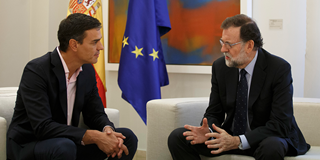Since Catalonia's referendum on independence on October 1, regional leaders and their sympathizers have called repeatedly for international mediation between the Catalan and Spanish governments. But external mediation would pose a severe threat to democracy and the rule of law – and not only in Spain.
MADRID – On the evening of October 10, Catalonia’s separatist president, Carles Puigdemont, stood before the regional parliament to deliver what was widely expected to be a unilateral declaration of independence. But he ended up offering a fudge. Despite asserting “the mandate that Catalonia become an independent state in the form of a republic,” he proposed “suspending the effects of the declaration of independence to undertake talks in the coming weeks.”
The performance left more questions than answers, but that was precisely the point. Puigdemont was not addressing anti-independence protesters on the streets of Barcelona, or Spanish citizens more broadly. He was speaking to the international community. Like his fellow Catalan separatists, Puigdemont knows that the movement’s only chance of moving forward lies in internationalization.
Since the Catalan regional government held an illegal referendum on independence on October 1, its separatist leaders and their sympathizers have called repeatedly for international mediation in their standoff with the Spanish government. The goal, exemplified by Puigdemont in his speech, is to make Catalonia appear magnanimous, in order to get the international community on its side.

MADRID – On the evening of October 10, Catalonia’s separatist president, Carles Puigdemont, stood before the regional parliament to deliver what was widely expected to be a unilateral declaration of independence. But he ended up offering a fudge. Despite asserting “the mandate that Catalonia become an independent state in the form of a republic,” he proposed “suspending the effects of the declaration of independence to undertake talks in the coming weeks.”
The performance left more questions than answers, but that was precisely the point. Puigdemont was not addressing anti-independence protesters on the streets of Barcelona, or Spanish citizens more broadly. He was speaking to the international community. Like his fellow Catalan separatists, Puigdemont knows that the movement’s only chance of moving forward lies in internationalization.
Since the Catalan regional government held an illegal referendum on independence on October 1, its separatist leaders and their sympathizers have called repeatedly for international mediation in their standoff with the Spanish government. The goal, exemplified by Puigdemont in his speech, is to make Catalonia appear magnanimous, in order to get the international community on its side.